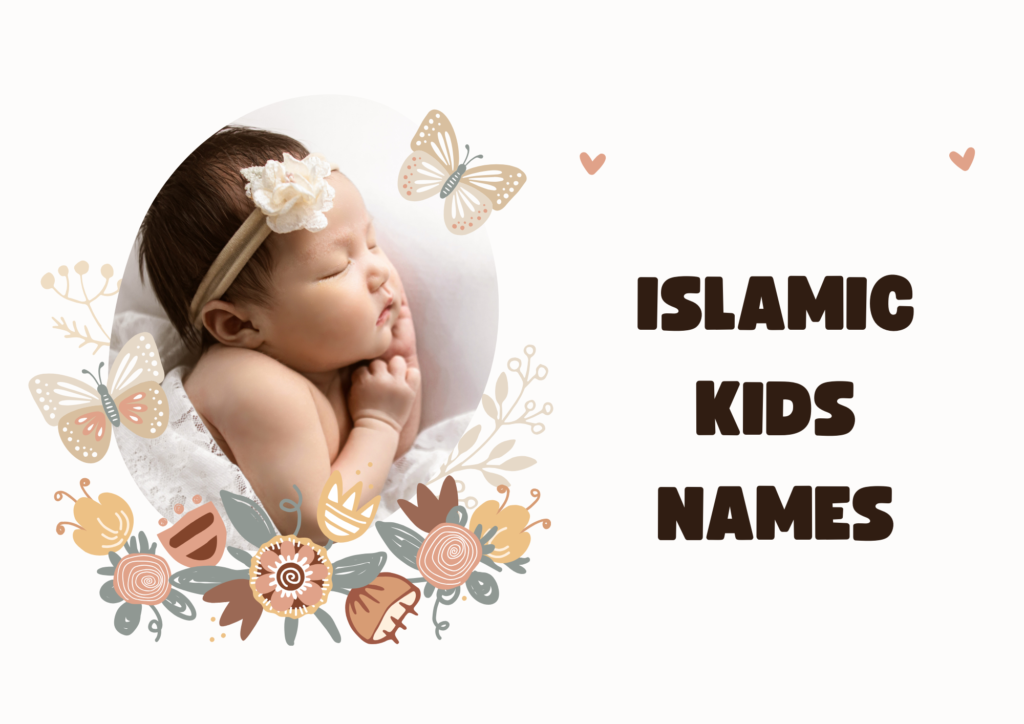First of all:
What Are Islamic Names? Islamic tradition holds that a person’s name has great meaning, forming their identity and expressing their basic principles. The choosing of names is a spiritual ritual inspired by the teachings of the Quran and the customs of Prophet Muhammad (peace be upon him), not just a formality. This topic explores the significance of names in Islam, showing how they represent meanings, qualities, and a link to the divine in addition to acting as identifiers. Comprehending the significance of Islamic names reveals a multifaceted mosaic of religious beliefs, cultural legacy, and ageless customs that emphasize the necessity of meaningful nomenclature within the Muslim community.
The Quran’s Impact on Names:
Islamic names originate from the Quran, the sacred book of Islam and a perennial source of guidance for believers. This section examines the significant impact that Quranic verses have on how people are named. Numerous names with profound connotations that hold spiritual value and frequently reflect the qualities of Allah are found in the Quran. This topic illuminates the divine relationship between language, spirituality, and the enduring cultural legacy ingrained in Islamic names by looking at how the Quran affects naming traditions.
Significance and Symbols:
Comprehending Islamic names entails more than just recognizing them; it also entails interpreting their deep symbolic meaning.
1. Selecting Names with Intention:
examining the significance of choosing names that are denotative of qualities and positive traits.
2. The Meaning of Islamic Names:
examining how names frequently have symbolic meaning and represent traits like kindness, faith, and resiliency.
3. Historical and Cultural Symbolism:
highlighting the historical and cultural background that gives Islamic names’ connotation more depth.
4. Effect on Individual Identity:
talking about how a person’s identity and the principles they live by can be influenced by the name they choose.
Effect on Individual Identity:

In Islamic culture, a person’s name is more than just a label; it is a deep expression of who they are. This section looks at how a person’s name, which is meaningful and purposefully selected, shapes how they see themselves. It talks about how a person’s name may have a profound impact on how they navigate the world, develop their values, and become a different person. We can learn more about the relationship between language and spirituality as well as the long-lasting value of meaningful nomenclature in forming the cultural fabric of the Muslim community by investigating the influence of names on human identity.
Religious Variations in Islamic Names:
Regional Differences:
analyzing the many linguistic impacts that Islamic names display in various geographical locations.
Historical Background:
investigating the background history that influences the different naming customs that exist among Muslims.
Ancestry’s Effect:
examining the influence of family history and ancestry on Islamic naming customs.
Impact of Globalization:
examining the ways in which cultural interchange and globalization have impacted the naming practices of various Islamic communities.
Maintaining Cultural Legacy:
highlighting the significance of maintaining distinctive naming customs as a means of protecting cultural heritage.
Naming customs and practices:

This section explores the relevance of enduring traditions as well as the diverse web of Islamic naming customs. It illuminates the cultural subtleties surrounding childbirth in the Muslim community by examining numerous naming ceremonies and traditions. These customs—such as the traditional shaving of a child’s hair at the Aqiqah rite or the sincere prayers said by loved ones—showcase the significance given to the spiritual and social dimensions of naming. Gaining knowledge of these customs helps one appreciate the great importance that Islam places on naming, which strengthens the bonds and sense of identity that exist within Muslim families.
The Prophecy regarding Names:
This section provides an in-depth analysis of the wisdom of the Prophet Muhammad (peace be upon him) with reference to the important Islamic ritual of naming. His teachings, which are contained in the Hadiths, offer timeless advice on choosing names that are associated with virtues and good connotations. Through an analysis of particular titles attributed by the Prophet, this section highlights his focus on qualities that demonstrate compassion, righteousness, and faith. His advice has a deep spiritual significance that promotes moderation, asking followers to uphold customs while welcoming novel and significant decisions. Gaining insight into the Prophet’s viewpoint enhances the naming process by bringing it into line with Islamic principles and virtues.
Popular and Well-Known Baby Girl and Boy Names, together with their Meanings:

Islamic Names Table: Boys
| Name | Meaning | Name | Meaning |
| Abdullah | Servant of Allah | Amir | Prince, leader |
| Bilal | Respected, noble | Hasan | Handsome, good |
| Idris | Studious, wise | Kareem | Generous, noble |
| Musa | Moses, a prophet | Nabil | Noble, capable |
| Omar | Life, flourishing | Zayd | Abundance, growth |
| Ayaan | Gift of God | Rayyan | Gates of Heaven |
| Zain | Beauty, grace | Ihsan | Kindness, benevolence |
| Rafiq | Companion, friend | Tariq | Morning star, pathfinder |
| Arham | Merciful | Rayan | Gates of Heaven |
| Sulaiman | Peaceful, man of peace | Rashid | Righteous, guided |
| Yusuf | God increases, Joseph | Ilyas | The Lord is my God |
| Inayaat | Blessings, grace | Sufyan | Devoted to worship |
| Saif | Sword, warrior | Zayyan | Beautiful, adornment |
| Iqbal | Prosperity, good fortune | Hamza | Lion, strong |
| Taqi | God-fearing, pious | Taha | Pure, virtuous |
| Kareem | Generous, noble | Nuh | Noah, a prophet |
| Jawad | Generous, open-handed | Shoaib | A prophet’s name |
| Fahad | Leopard, cheetah | Subhan | Praise be to Allah |
| Zainul Abidin | Ornament of the faithful | Jalal | Glory, majesty |
| Qasim | Distributor, one who gives | Wasim | Graceful, handsome |
| Yasin | One of the Prophet’s names | Aariz | Respectable man |
| Faisal | Decisive, resolute | Raheel | One who travels |
| Sameer | Companion in evening talk | Taimur | Iron, strong |
| Aarav | Peaceful, calm | Zaki | Pure, virtuous |
| Ihsan | Kindness, benevolence | Waleed | Newborn child |
| Hadi | Guide, leader | Ziad | Growth, abundance |
| Amir | Prince, leader | Samir | Entertaining companion |
| Zayd | Abundance, growth | Daniyal | Intelligent, wise |
| Qais | Lover, adorer | Asim | Protector, defender |
| Wasif | Describer, one who defines | Azhar | Shining, radiant |
| Imran | Prosperity, long-lived | Feroz | Successful, victorious |
| Ismail | Heard by God | Adnan | Settler, one who settles |
| Wasiq | Confident, assured | Rameez | Symbol, sign |
Islamic Names Table: Girls
| Name | Meaning | Name | Meaning | |
| Aisha | Alive, living | Fatima | Captivating, abstinent | |
| Hana | Happiness, bliss | Layla | Night, dark beauty | |
| Noor | Light, radiant | Rahma | Compassion, mercy | |
| Salma | Peaceful, safe | Yasmin | Jasmine flower | |
| Zara | Princess, flower | Samira | Companion in evening talk | |
| Aaliyah | High, exalted | Naima | Tranquil, serene | |
| Farah | Joy, happiness | Dalia | Dahlia flower | |
| Sabrina | Patient, persevering | Amara | Eternal beauty | |
| Inara | Illuminating | Noura | Light, radiance | |
| Mariam | Beloved, drop of the sea | Sana | Radiance, splendor | |
| Amina | Trustworthy, faithful | Jana | Paradise, garden | |
| Ayesha | Alive, living | Fariha | Happy, joyful | |
| Zainab | Adornment of the father | Alina | Beautiful, bright | |
| Amani | Wishes, aspirations | Safiya | Pure, chosen | |
| Leila | Night | Nada | Generous, dew | |
| Huda | Guidance, right path | Amina | Trustworthy, faithful | |
| Sanaa | Resplendence, brilliance | Rayna | Queen | |
| Nyla | Winner, successful | Nour | Light, radiance | |
| Latifa | Gentle, kind | Amal | Hope, aspiration | |
| Lamis | Soft, gentle touch | Aalia | Exalted, noble | |
| Yasira | Lenient, compassionate | Elina | Bright, shining | |
| Layla | Night, dark beauty | Hadiya | Gift, guide | |
| Amira | Princess, leader | Iman | Faith, belief | |
| Zayna | Beauty, grace | Rania | Queenly | |
| Lina | Tender, delicate | Zaina | Beautiful, graceful | |
| Joud | Generosity, excellence | Naila | Successful, attainer | |
| Reem | Gazelle | Zoya | Alive, life | |
| Safa | Pure, clear | Maya | Princess, mother | |
| Nailah | Successful, attainer | Noura | Light, radiance | |
| Rasha | Gazelle | Farida | Unique, precious | |
| Amal | Hope, aspiration | Dana | Wise, knowledge | |
| Farida | Unique, precious | Ayla | Halo of light | |
| Layla | Night, dark beauty | Dua | Prayer, supplication | |
| Nadia | Caller, announcer | Imaan | Faith, belief | |
| Rukhsar | Cheek, face | Rida | Satisfaction, contentment | |
| Soraya | Star, princess | Zara | Princess, flower | |
| Tahira | Pure, chaste | Amina | Trustworthy, faithful |
Current Developments in Islamic Names:
Modern Preferences:
examining the naming practices that are currently popular among Muslims.
Combination of Modern and Tradition:
examining how contemporary Islamic names manage to reconcile traditional connotations with modern tastes.
Creative Spellings:
talking about the popularity of creative spellings that preserve the meaning of classic names.
Cultural Adjustments:
examining the ways in which the worldwide world of today affects the selection of Islamic names through cultural modifications.
The impact of popular culture:
recognizing how popular culture influences the naming process and how it reflects shifting social mores.
Effect of Names on Identity:
This section examines the significant influence Islamic names have on the formation of Muslim community identities, both collectively and individually. It explores how people view themselves and are regarded by others, recognizing the significant impact names have on human identity. This section explores the relationship between cultural, spiritual, and familial identities and how a name selection affects continuity and a sense of belonging. It highlights the long-lasting influence of names in developing a positive sense of self, molding personalities, and strengthening the bonds of the larger Muslim community.
In conclusion:
In summary, Islamic names have more meaning than just labels; they are a strong thread that unites generations, preserves cultural legacy, and strengthens the bonds of Muslim identity. These names, which have their roots in significant nomenclature, embody the core of qualities and values and strengthen the bonds within the Muslim community. The deliberate naming process guarantees the survival of cultural customs and spiritual contemplation by serving as a link between the past and present. In the end, Islamic names serve as a tribute to the lasting influence of a rich past, uniting people with their ancestry while accepting the changing nature of the contemporary world.
Frequently Asked Questions (FAQs)
What are Islamic names?
Islamic names are names derived from the Quran, the holy book of Islam, or inspired by the traditions and teachings of Prophet Muhammad (peace be upon him). These names often carry meanings rooted in spirituality and virtue.
Why are names important in Islam?
Names in Islam are not just labels; they are significant as they reflect a person’s identity, values, and spiritual aspirations. Choosing meaningful names is a way to uphold Islamic principles and express cultural heritage.
How do Muslims choose names for their children?
Muslims often choose names based on their meanings, looking for attributes that reflect positive virtues. They may also seek inspiration from the Quran, Hadiths, or the names of respected individuals in Islamic history.
Do Islamic names have specific meanings?
Yes, Islamic names typically have meanings that convey positive attributes, virtues, or reflect the glory of Allah. The meanings are often rooted in Arabic language and culture.
Is there a difference between Arabic names and Islamic names?
Arabic names come from the language; Islamic names, rooted in Islam, may include Arabic or other languages.

